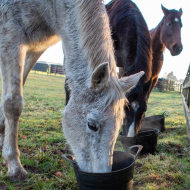Free webinar to explore equine behaviour and diet

The evening will focus on the types of forage suitable for horses.
World Horse Welfare has announced a new Zoom webinar exploring the connections between a horse's diet and their behaviour.
Chaired by BEVA veterinary projects officer Lucy Grieve, the free event will look at how to promote positive behaviour and welfare through day-to-day feeding practices.
Lucy will be joined by certified animal and equine behaviourists Rosa Verwijs and Justine Harrison, who will be on hand to answer any behaviour and nutrition-related queries.
A World Horse Welfare spokesperson said: “Behavioural issues are widely reported in all areas of the equine industry and solutions often involve a holistic approach: utilising the skills and expertise of professionals such as vets, nutritionists and behaviourists.
“The evening will include a discussion on the fundamentals of equine nutrition, an essential topic relevant for all horse owners. We will focus on the types of forage suitable for horses, examining the link between diet and behaviour and providing strategies on how to promote positive behaviour through provision of forage and suitable diet planning.”
Taking place on 18 January, the webinar forms part of World Horse Welfare's popular Welfare Wednesday series, which has previously tackled subjects such as keeping horses fit, weight management, euthanasia, biosecurity, travelling, and cutting costs, not care.
For more details and to register your place, click here.



 The RCVS has announced a new version of its 1CPD mobile app, with enhanced features for veterinary surgeons and veterinary nurses to record their continuing professional development.
The RCVS has announced a new version of its 1CPD mobile app, with enhanced features for veterinary surgeons and veterinary nurses to record their continuing professional development.